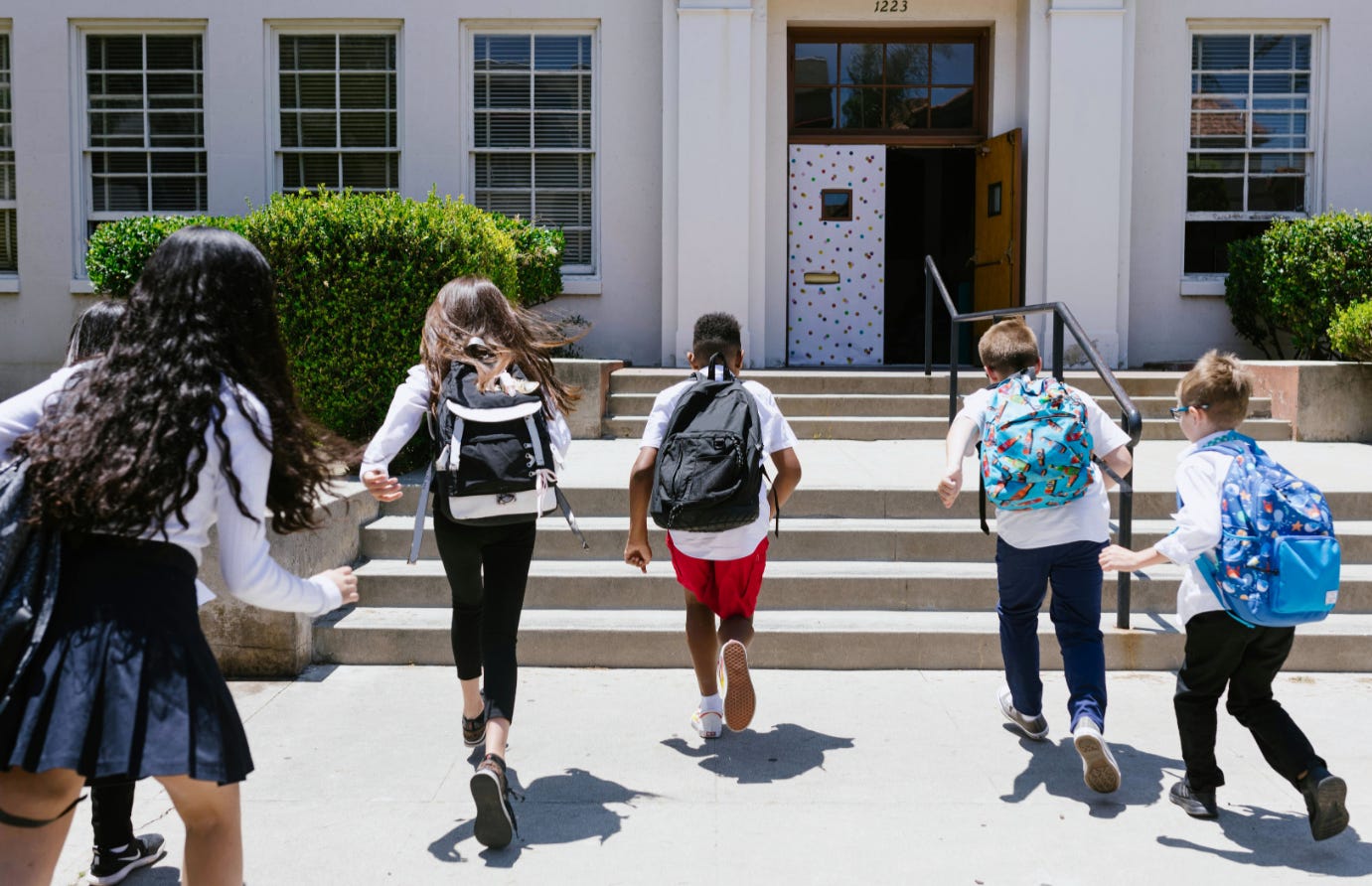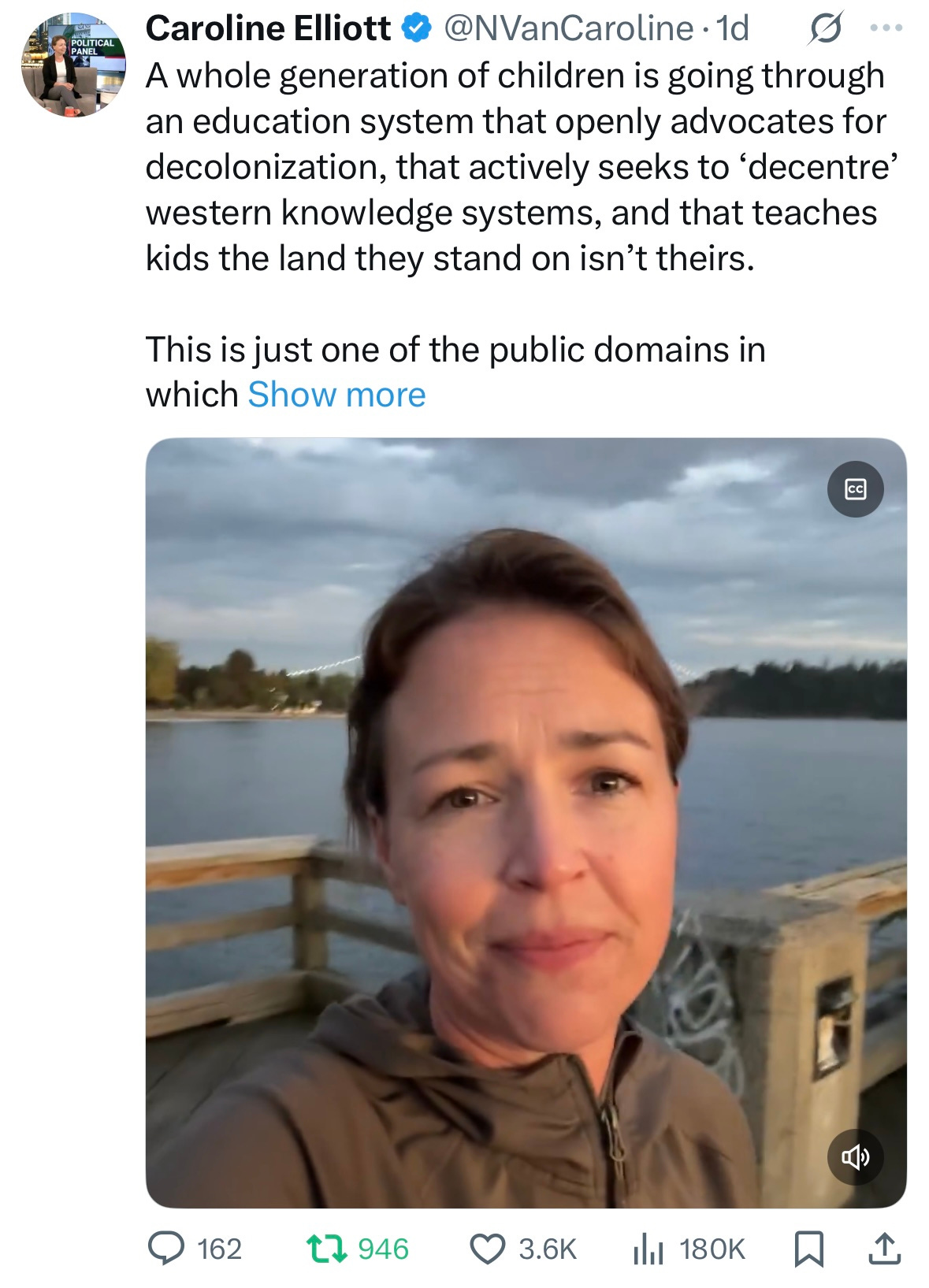Caroline Elliott: The left's brazen takeover of our children's education
A well-rounded education includes teaching children -- from a position of ideological neutrality -- how they might challenge existing knowledge. Instead, we're seeing an activist agenda.
With last month’s back-to-school rush now settled into a day-to-day routine, most parents are happy to put their trust in the education system and to get moving on their fall priorities. But that system has its own priorities, dictated by an ideologically-driven provincial government hellbent on promoting its radical agenda to schoolchildren.
If that sounds implausible, take a look at B.C.’s Anti-Racism Curriculum Guide for Teachers. The guide purportedly gives elementary and secondary school teachers various tools and strategies to promote anti-racism education as part of their teaching practices. It sounds harmless enough, but a deeper dive reveals its role in advancing critical race theory doctrine in our school system.
As the B.C. government declares elsewhere, “[i]t is not enough to be ‘not racist,’ we must be anti-racist.” And as far as they’re concerned, our kids are the perfect little soldiers in their social justice war, even as educational outcomes plummet and pride in our country amongst our youth trails behind that of older generations.
The curriculum guide begins by instructing teachers to have children participate in “reflecting on and building awareness of privilege, identity, and positionality,” ensuring that the colourblind bliss of early childhood is replaced by an awareness of their role as either perpetrators or victims of discrimination.
Children are also to be trained in “developing a mindset of cultural humility,” which presumably does not involve appreciating the societal merits that draw millions of people to apply for Canadian residency each year.
Teachers are further instructed to guide students in “challenging and decentering colonial structures, knowledge systems and hierarchies, and dominant cultural narratives.” The guide is not clear as to whether the challenging of such structures should extend to our colonially-introduced democratic institutions, our legal processes that provide for non-violent dispute resolution, our national defence system that protects against hostile foreign powers, our constitution that protects our freedoms and the rights of minorities and Indigenous groups, and so on.
What, exactly, decentering “dominant cultural narratives” entails is similarly unclear. Is it stories of the fur trade and the integral role Indigenous groups played? The Battle of the Plains of Abraham? The War of 1812? Is it our unlikely story of Confederation and our distinctive founding peoples? Is it the Red River Rebellion? Building the railroad? The heroism of our troops in World Wars I and II? There are plenty of ‘dominant’ Canadian narratives, but no indication of what aspects of which cultures ought to take their place.
The guide goes on to offer numerous examples of how we might apply an anti-racist lens across the curriculum, from Kindergarten through Grade 12. Among the less intuitive applications is the Physics 12 “anti-racist lens,” which requires students to ask “how can research using Indigenous research paradigms… impact awareness of our own biases?” The Pre-Calculus 12 “anti-racist lens,” on the other hand, expects students to “incorporate First Peoples worldviews, perspectives, knowledge and practices to make connections with mathematical concepts.”
This almost herculean stretch of the “anti-racism” effort to fit classes like physics and pre-calculus would be almost humorous if our children’s education wasn’t already falling behind. As the Fraser Institute reports, “less than half of British Columbia Grade 10 students are now proficient in numeracy.” From 2003 to 2022, B.C.s math scores have nosedived by 42 points (a 20-point drop is equivalent to about one year of lost learning). This means 15-year-olds in B.C. are over two years behind where that age-group was in 2003.
The guide also offers an explanation of “anti-racism reminders,” which are government-produced posters that, incidentally, hang in my own children’s elementary school. They include sinister warnings that “Racism sometimes hides in politeness,” and that admonish passing kindergartners that “If you are unaware of your privilege, you might be privileged.” (The latter almost uncannily exemplifies a ‘kafkatrap’ referenced by Bruce Pardy in the National Post: “If you deny that you are a witch, then you are a witch. And if you do not deny it, then you are a witch for sure.”)
The ideological liberties the provincial government has taken with the K-12 curriculum is working. Numerous polls show a large disconnect between younger and older Canadians when it comes to perceptions that they live on stolen land, that their country is genocidal, that systemic racism is prevalent in their country, and even in terms of pride in Canada itself.
A full 58 per cent of younger Canadians aged 18 to 24 think the country belongs to Indigenous peoples, with just 24 per cent of Canadians over 65 feeling the same way. 57 per cent of those between the ages of 18 and 34 say they have observed evidence of systemic racism in their province, with just 44 per cent of those 55 and older saying the same. And while a promising 51 per cent of 18 to 34 year olds think we should focus on Canadian pride, this number trails far behind the over-55 age group at 81 per cent.
Obviously, a well-rounded education includes teaching children how they might challenge existing knowledge. It includes explaining the darker moments of our country’s history and shining a light on the existence of racism in the past and present. It is entirely possible to do all of that from a place of ideological neutrality. But instead, we’re seeing an activist agenda imposed by politicians, permeating every subject from primary school to Physics 12.
Our education system plays a hugely influential role in how the next generation sees the world, and how they see each other. It plays an immense role in shaping the future leaders of our province and country who will determine our collective path forward. We can’t continue to allow politicians to dictate the terms of our children’s education along their own ideological lines.
Dr. Caroline Elliott is a co-founder and contributor to Without Diminishment.
Watch Caroline’s viral Without Diminishment introduction and call to action on Twitter/X, or on Instagram.






When the ‘public education’ system becomes focussed on indoctrination instead of education we all lose. It is time for massive reform that provides parents and students with more choices, the opens up the system to the expertise of the who community, that questions the orthodoxies that hold us back. It’s time to meet each child’s needs rather than meeting the doctrinal needs of government.
Many good points, Caroline, although I think my absolute favourite was this: "There are plenty of ‘dominant’ Canadian narratives, but no indication of what aspects of which cultures ought to take their place."
I think that's precisely the most illogical and incoherent aspect of the left's push for culture change -- there is no clear destination or end point identified by the bulk of its proponents. How do we know anti-racism has succeeded? Is it when difference ceases to exist? Or is it when very specific aspects of difference can be extracted, as though such a thing is possible?
The broader cultural push to accomplish this agenda of marginalizing Canada's history and identity likes to pretend that all of the "good" (tolerable or desirable to the left) aspects of Western culture, like respect for pluralism and individual freedoms, can survive being surgically removed from the broader cultural context, without their inherent diminishment. Homogeneity has always been the default throughout human history and typically the most conducive to stability and peace.
As someone who spent five years studying pre-modern Asian history, Sanskrit, and the broader Sanskrit cosmopolis -- multicultural cosmopoleis are truly rare and prior to the modern period they didn't exist without significant segregation and some kind of clearly defined cultural hegemony.) I'm sure I'm preaching to the choir here, but the fact that rapidly scaling, essentially peaceful multiculturalism has emerged in places like Canada is not an accident. It is the product of the post-colonial integration process within the specific cultural ecosystem that birthed liberal humanism and modern democracy.
Or even more stupidly, it posits that an ethic of ressentiment is a suitable and sustainable alternative foundation for a societal culture. Grievance studies are inherently self-limited in their long-term applicability to governing, because eventually you can't keep blaming the past when you've been in power long enough. At that point it goes two ways: violent extirpation of the "privileged class" or it just peters out and you've just disintegrated the culture that once carried your very society and its underlying values. And yet, their core precepts are being applied with reckless abandon and the damage being done to Canada's social fabric in the meantime is profound.
The mythos of a revolution is only relevant for as long as the members of your society remember the time before. In China or the Soviet Union, their revolutions instigated real economic upheaval and arguably supercharged their economic development. Even if the original narrative of their respective revolutions was "fuck the overclass", very quickly it was "with our superior economic model, we have made life so good." USSR couldn't keep it up, but China did and has.
What exactly is the model of society and interethnic and intercultural relations that they are seeking to create by driving the guilt, shame, and fingerpointing? What model of society will "positionality" create, except for one that entrenches position by heredity? There's celebrating difference as a way to truly promote multiculturalism, fairness, and intercultural harmony, which I think we are absolutely excellent at as Canadians, and then there's disparaging an entire culture and by extension the people who belong to that cultural background. The two are weirdly confused by those who really should know better, even though the latter should be easily to name and shame as fundamentally illiberal.
Also as you've implied, CRT's unique Canadian formulation doesn't account for the reality that other cultures will continue to exist, many of them way less shy about taking space and driving the narrative bus. Few are as pluralism-compatible as the root Canadian culture. (And I say this as a child of Russian immigrants, grateful for this society that I've assimilated into.)